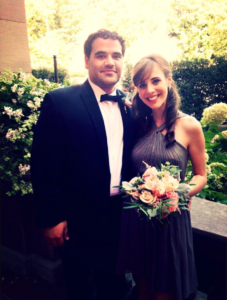Alyssa Mackenzie, a 27-year-old Connecticut native, was recently diagnosed with systemic lupus erythermatosus (SLE). She’s no stranger to chronic illnesses, though, and has been dealing with multiple autoimmune disorders since birth. Alyssa writes about her experiences on her blog, Make Lemonade with Lupus, and also on her Instagram account. Here, she shares her thoughts and advice in a Q&A for Health Stories Project.
When were you diagnosed with lupus?
Lupus was on the table for quite a while before my doctors settled on this diagnosis just this past year. Though symptomatic since infancy, and despite lab work that was always lupus-y in nature, my physicians were hesitant to use a term beyond “lupus-like” because they didn’t feel it encompassed all of my secondary or even tertiary diagnoses well enough to be the umbrella term for what ailed me. 


In fact, not all of my doctors believe that lupus is exactly what I have. Truly, it’s a monster of a disease with many faces and that coupled with the fact there’s no specific lupus test makes it difficult to diagnose. Add to that my genetic conditions (and how little the medical world knows about the human genome and how variances affect us), and you can see why it wasn’t until this last year that a specialist was willing to say “you have lupus and we are going to treat you for that and see what happens.”
It took 27 years to reach this diagnosis. A lupus specialist will say I have the disease without question, but an academic rheumatologist might consider what they are researching in terms of autoimmunity and feel more confident saying what I have exactly hasn’t been discovered/named yet, but looks like lupus. Even this, just the nomenclature, is complicated.
Why did it take so long for your doctors to reach this diagnosis?
The trouble with a disease like lupus is the understanding isn’t complete enough for there to be this clear picture with a, b, and c. Trying to make sense of that, trying to parse out what causes what, can be really complicated and convoluted and shines a light onto why more people don’t know more about lupus.



At 19, thanks to an allergic reaction to a bee sting and then an adverse reaction to a subsequent steroid taper, we realized my blood pressure and heart rate were an issue. That’s when I was tested for and diagnosed with Postural Orthostatic Tachycardia Syndrome (POTS), a form of Dysautonomia where my heart rate spikes and my blood pressure drops when I move positions.
It was from there that other diagnoses began to fall into place and we really started to try to make sense of the puzzle that was my body. It took five or so more years for my doctors to discover I have an autommimmune small fiber poly neuropathy (SFPN) called Juvenile Onset Small Fiber Poly Neuropathy (JOSeFINe) that causes widespread pain, among other things. JOSeFINe explained the POTS and pointed toward an underlying autoimmune disease, and it took three more years before anyone was willing to definitively call it lupus.
I suppose this is all evidence as to why some people refer to their medical history as a “journey!” It feels more like an endless schlep to me.
What are some misconceptions people have about lupus?
Despite lupus affecting 1.5 million Americans, many people don’t know what lupus is or what it does or that there currently is no cure. I was really interested to see Selena Gomez open up about her SLE diagnosis and the fact she had undergone chemotherapy as a treatment, which is quite a common therapeutic plan. When I saw one publication write that “aspirin” was a common treatment for lupus patients, however, and then saw this source’s words get repeated as fact I was disheartened. Not only was it an exaggeration, it undermined how awfully debilitating the disease is.



There’s a lot of misinformation out there about the medical world, and so I’m not surprised to see it first-hand here in lupus’ ring. I’m used to the questions that bare evidence to mainstream confusion over the disease. I’m often asked outright if I’ll be able to have kids, or told that I’m too young to be so sick, especially with a disease like lupus (that’s almost as bad as being told “you don’t look sick”).
But just as lupus is a disease with many faces — a spectrum of variability — it also holds little bias in terms of whom it affects. Men can have lupus. Children can have lupus. Lupus looks different in each person. Every single person is affected differently; no two are the same. This is why awareness is so important. Education is the first step in any kind of development.
What is something you have learned living with lupus?
I’m not one who ascribes to an “everything happens for a reason” mentality (I think it takes our autonomy away, when it is what we do with an event that I think is the crux of the matter). But I could see the argument that I have never been known to be a particularly patient person and in being a chronic patient, I am certainly learning patience hell or high water: with slow processes, with other people, with my body and my sense of self. It’s one education I did need to have, although I wouldn’t have minded other circumstances.
What would you tell someone who has just been diagnosed with lupus?
First of all, you are going to be okay. Tell yourself that, as many times a day as you can. Lupus is scary; any diagnosis is scary to come to terms with. But, every year the field of science is learning more about the human body and specifically this disease and the medications that throw this disease into remission. Odds are in your favor: most people diagnosed with lupus live totally normal lifespans now. More and more lupus patients are living “normal” lives. As overwhelming as it all is, I promise you will be okay. You can handle this. It may be hard, at times harder than others, but not impossible.



Always remember that grief is cyclical and not linear. That you will experience a range of emotions, more intense at first. It is okay to be sad, mad, or frustrated. Whatever you feel is totally normal for you, and it’s easiest not to fight it but instead allow it to take its time before it moves on. It is OK to mourn the loss of your former self. Who you thought you were, or who you thought you would grow to be. You’re still you, but your lens is different now and that’s OK. You are learning just how strong, resilient, and brave you are. You are learning just how much your body can put up with, how hard it can fight. It’s not fun to learn these lessons this way, but you are learning them and you can find pride in that.
While we’re on the subject, be proud of yourself as much as possible. You are deserving of pride. You are so many things that sickness can sometimes cloud. Don’t let the diagnosis blind you from all that you are still are. You are enough. You are more than enough.
[tweet_box design=”default”]”Never lose your sense of humor. It can help you through both the darkest of times.” – Alyssa. #Lupus[/tweet_box]
What’s the most important piece of advice you have for someone living with lupus?
Never lose your sense of humor. It can help you through both the darkest of times and the most superficial of interactions, and you’ll be so glad it’s still there on days you’re feeling better. Because of this diagnosis, you will become a master “silver liner” yourself if you aren’t already, and you will learn to count every single blessing in your life whenever possible. Coming through with your sense of humor intact is about the bravest thing a person can do and will only serve you going forward. You’re already a superhero, consider it your cape.
Have you been affected by lupus or another health condition? Sign up to share your experiences with Health Stories Project!


This is such a great resource and serves as a much needed place of connection for chronic illness sufferers. Reading Alyssa’s story really hit home. I too was diagnosed with Dysautonomia first in my 20’s and then Lupus at 30. It’s amazing how many other similarities there are in our health stories. I haven’t been able to work for the last 7 years and in 2015 had to have my colon removed. Thankfully I am still here and fighting each day to find purpose. I volunteer at a disability center and hope to get certified this year as a Nutritional Thereapy consultant. I have studied tirelessly and learned how to bake grain-free, anti-inflammatory, good for you treats! Hoping to help others in this fight against chronic illness! Alyssa was right when she said, Letting go of our old life can be very difficult. It is like mourning a death. And she was also right about it not being linear. I have been on this journey for almost half my life and I’m still going through seasons of sadness and mourning the loss of my old self. But then I realize how much stronger in spirit my ‘new self’ is and with a lot more compassion than ever before. I know those things are of great value, especially when coming along side others in their struggles and baring each others burdens along the way. Thankful for the health stories site! Keep up the great work! It’s a blessing to all of us!
Thank you for your story, It always gives me à breath to know that I am Not alone in how I feel. even though I know others are way worse at times than me I still fight daily for Myself and Others. To show you that Their Not alone.